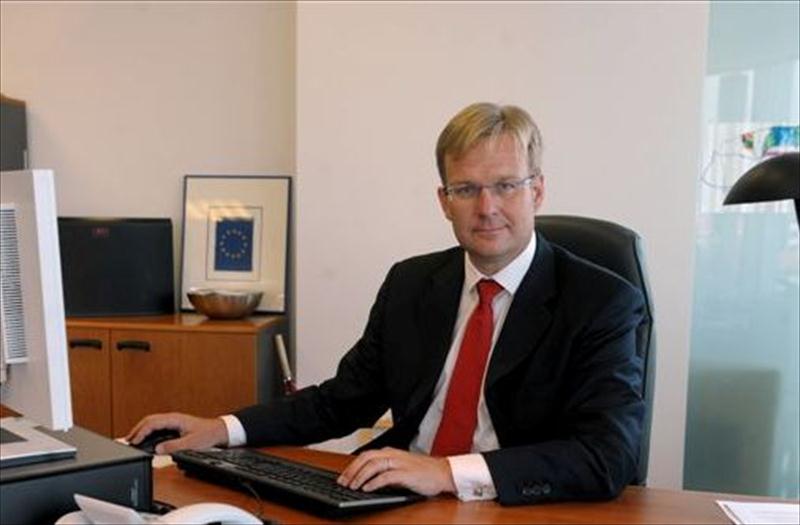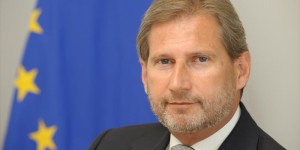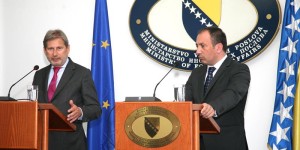‘Making 2012 An EU Year For BiH’
Remarks to the Krug 99 gathering, Sarajevo, Sunday 26 February 2012
First of all, a warm ‘thanks’ for the kind invitation to your gathering here today. I very much value and enjoy opportunities such as these when we can reflect on our own work and experiences and exchange opinions.
Today I will address, as you have requested, the issue of the EU perspective of Bosnia and Herzegovina. The Chairman of the Council of Ministers, Vjekoslav Bevanda some days ago expressed confidence that 2012 could be ‘an EU year’ for Bosnia and Herzegovina. I agree with him. Chairman Bevanda’s hope is also that Bosnia and Herzegovina can apply for membership of the EU. So the real question is – how can we make 2012 an EU year for Bosnia and Herzegovina?
I should note that the EU and all its Member States are satisfied to finally see a state level government now in place in Bosnia and Herzegovina. Mr Bevanda has already addressed a meeting of all the EU Ambassadors here in Sarajevo and I am looking forward to a close working relationship with him and his ministers. Until the appointment of Chairman Bevanda, there has been a space where our primary partner should be, and it is now finally filled.
Let’s turn to the membership perspective and its implications for our relationship.
First of all allow me to make what might seem an obvious statement but it is important to keep conveying it: there is a firm EU policy in place that we want Bosnia and Herzegovina to join our family of states. This is essential, it cannot be overemphasised and it should not be forgotten. I hear many commentators enumerating the reasons why the EU supposedly does not want this or that country to join – financial reasons, the myth of ‘enlargement fatigue’ and so on. But I can assure you that the membership perspective is very much alive and well. The EU perspective for Bosnia and Herzegovina is a firm commitment of all the 27 Member States. There is no doubt about my own belief in this, the question is, do you? Just to prove we are putting action behind our policy, let me say that the EU has not reinforced its presence here for my well being or that of my career: we are here in greater numbers and a more organised form for the very purpose of helping Bosnia and Herzegovina make real progress towards the EU.
Bosnia and Herzegovina is a European country. We already have many links between us – people, culture, trade. And there are real, positive contributions that Bosnia and Herzegovina can make to the Union as a member – Bosnia and Herzegovina will bring to the table, as well as it beautiful landscape, the capacity of the people, the richness of your culture and history and the potential of your resources . This is adding to the overall enlargement process that will entail the entire region joining the EU. There is something in it for you and something in it for us.
Over the past decades you have had more than the normal range of international organisations in your country. After a while I am sure that this becomes a bit of an ‘alphabet soup’ and everything blurs into one.
But I strongly believe that the perspective of EU membership for the country makes the relationship between you and us fundamentally unique – and different. Because when you eventually become a member of the EU, it will be on an equal footing and so when we talk about Bosnia and Herzegovina and the EU, we are indeed talking about a relationship of commitment, of partnership and of longevity.
But the EU integration process is not a substitute for domestic consensus. You – the intellectuals, NGOs, media, politicians, public servants – need to forge this vision that makes it apparent to everyone that this is the way forward. I believe personally that Bosnia and Herzegovina is on a good path to have such consensus. But it does not come put of nothing – and it needs to be nursed, kept intact and on top any any other agenda to succeed. I particularly welcome the moral responsibility and leadership that you, the intellectuals of the country, provide in this regard. Without you, such a vision stands little chance of surviving in the public debate.
That shapes what our relationship should be like. Partnership means partnership – there are responsibilities for us and responsibilities for Bosnia and Herzegovina. We should each address our own responsibilities or tasks as I rather would call them.
Another point I would like to make: only states join the EU. Bosnia and Herzegovina has a complex constitutional structure, enough words have been said about that. But there are internal arrangements in EU member states that can also be considered very complex. As I have said many times before: the EU fully respects the security, territorial integrity and constitutional order of Bosnia and Herzegovina. Despite this complexity we believe – based on our own experiences – that there are ways that Bosnia and Herzegovina can withstand the economic, social and political and other pressures that eventual membership will bring upon the country. However, it requires that Bosnia and Herzegovina steps up to the challenge and addresses some of the current apparent weaknesses in the way that governance and reforms are conducted.
Due to the competences and because of the need for harmonisation of legislation across the whole country, Entities, Brčko District and even the Cantons will have relevance as interlocutors on some aspects related to EU integration. But our primary partner, the subject of our bilateral relations is and always will be the State. That’s to say that it brings some tasks to the doorstep of the State.
The EU cannot and will of course not accept a potential Member State that does not have the capacity to discharge its responsibilities in the EU integration process.
How all that eventually is ensured is something the political system of Bosnia and Herzegovina will need to discuss in connection with its eventual application for membership. When Bosnia and Herzegovina eventually applies for EU membership, it is essential that she can demonstrate that she has a functional, smooth and productive co-ordination in EU matters. One co-ordinated process must bring one result that is given to the EU with one voice.
I think a good beginning is to have a functional Council of Ministers in place as is the case now. For that reason alone I believe that with the recent establishment of the Council under the Chairmanship of Mr Bevanda, we are on a good way to make 2012 a more productive year in terms of EU accession than 2011 was.
In every enlargement country – including recently in Croatia – people in my position have to make a very good job of explaining: “why EU?” – “Why should a country choose to join the Union?” As far as I can see, the citizens of Bosnia and Herzegovina have a strong opinion on this question already. In the polls that I have access to, I see that generally that well over 70% of people think that EU membership is desirable for the country. That is or should be a clear signal to politicians and institutional leaders.
However, it should be explained that since its foundation, I believe that the EU has created an area of peace, justice, increasing prosperity and security that has improved the lives of its population – now over 500 million people. Through working together, through prizing consensus and taking action on common concerns, we have made great progress in prosperity – the EU was conceived as an economic project and is now one of the largest trading blocs in the world, where countries compete economically with each other on a level playing field. I am making this point because it is very important for any potential candidate country that they think about how their advantages can be used. You have advantages – such as energy and food production – and youcould be a leader on a number of issues. Here of course we realise one of the major potential advantages of EU integration and then membership – job creation both in the country and possibilities outside.
We have also made progress in spreading stability in a continent that has been torn apart several times by war. We understand that healing wounds takes time but there comes a time to look forward not back. Looking forward while not forgetting is done with respect. In doing so, we have created a dynamic that is supportive between the states. We have made sure that ‘good neighbourly relations’ is a reality between us.
So I think that the over 70% of people in Bosnia and Herzegovina, they are absolutely right. There is no shortage of areas where the EU acts to bring improvements: the environment, human rights, justice, trade, consumer protection – this is a Union that works on behalf of its citizens. The people of Bosnia and Herzegovina should have the opportunity to join this, the EU labour market, that people have traditionally been used to. Your products should flow seamlessly into the joint open market we have. You should have the opportunity to also enjoy the protections and rights of EU citizens. Investors should have the interest to come here and invest without any obstacles and with job creation as the most tangible outcome for the people. I see from the polls that this is what the people of Bosnia and Herzegovina – irrespective of where they live – think about when they think about the EU.
There are risks, let’s look at some of them. A brief word on how things could go off track. As I have already said, Bosnia and Herzegovina requires good internal co-ordination to be able to speak to the EU with one voice and thus make progress. The opposite also true: internal discord will slow the process of EU integration, as we saw recently with the long delay in forming the Council of Ministers. It is very clear that EU integration succeeds when it is treated as a common interest and an opportunity for consensus. It will stagnate if personal or community concerns are given a higher priority. And in particular any attempted use of EU processes as a battleground for vested interests will not lead to success.
We have already seen progress made on the EU integration agenda. The Law on State Aid has been passed as has a Law on the Population Census. These developments are very welcome to the EU.
But let me be honest – this is only a fraction of what is out there waiting to be done. Bosnia and Herzegovina needs to be in a higher gear in terms of legislative work to get up to the necessary speed. You would not be the first to do it, and we believe that you can do it.
As Mr Bevanda has acknowledged, the most pressing need right now is for a state budget for 2012 to be agreed and adopted. Institutions that have a role in EU integration should be properly financed, for instance the Anti-corruption Agency. Its operability is required for the visa liberalisation regime to remain in place. New authorities might be necessary depending on the speed of the EU integration process. And specific actions need to be funded: the most prominent example is perhaps the population and housing census. The preparatory work for the census operations in 2013 have already started and will continue throughout the whole year with a financing need of more than 10 million KM in 2012. The results will be fundamental for Bosnia and Herzegovina’s socio-economic development and we need this information in order to help Bosnia and Herzegovina. A Global Fiscal Framework for 2012 – 2014 must also be elaborated to ensure sound fiscal management. Crucially, EUR 100 million of macro financial assistance from the European Commission cannot be released until this Framework and an agreement with the International Monetary Fund is in place. So it’s understandable why the economic side is so important to Chairman Bevanda – we fully agree.
We are all familiar with the ruling of the European Court of Human Rights in the case of Mr Sejdic and Mr Finci. We have a contractual relationship under which Bosnia and Herzegovina needs to be compliant with the European Convention on Human Rights. We need to address this urgently. What we are looking for, for the next level of contractual relations are credible efforts in implementation. The European Union needs to see credible efforts made on this issue for Bosnia and Herzegovina’s Stabilisation and Association Agreement – our ‘contract’ – to be in force. When we do this, the SAA will be in force. That will further strengthen the EU integration process. We will be at the necessary level for Bosnia and Herzegovina to create a ‘track record’ after which a membership application can be launched.
The annual Progress Report issued by the European Commission in the second half of the year will reflect the – hopefully – even more positive development of the country. Politicians, intellectuals, NGOs and, not the least the economy in Europe carefully read this report and make use of it for the definition of their own policy vis-à-vis Bosnia and Herzegovina. Movement on the issues I have mentioned will be reflected in the Progress Report.
Allow me to reiterate that we need an effective mechanism – or working methodology – to deal with EU matters. This is so that the EU has an assurance that EU rules and standards will be implemented in Tuzla, Sarajevo, Mostar, Bihac, wherever, and an assurance that EU financial assistance will be properly spent.
It is, of course, up to Bosnia and Herzegovina to decide when to send a membership application to the EU. It is entirely a political decision. I hope that Mr Bevanda and the Council of Ministers will be able to meet all necessary conditions clearly spelled out in the Council Conclusions of 2011, in order to send a credible membership application. Sending a membership application that does not meet the threshold of being credible is absolutely not advisable. However if the authorities in Bosnia and Herzegovina work hard on making the application credible, I personally would warmly welcome this important achievement!
In concluding, what I mentioned is our combined ‘to do’ list for 2012. If we manage it, it will make 2012 into an EU year for Bosnia and Herzegovina. It is detailed and ambitious. But if you don’t have the courage to hope and strive then it won’t happen. It is clearly looking forward. Many objections could be raised, looking backwards. But I believe we can find a way to move forward while respecting what has happened here.
Our agenda is solely focused on EU integration. It will require the consistent engagement and good will of institutions, officials, politicians and civil society. It will surely benefit from your scrutiny and your support.
Thank you for your attention and I look forward to a good discussion.




